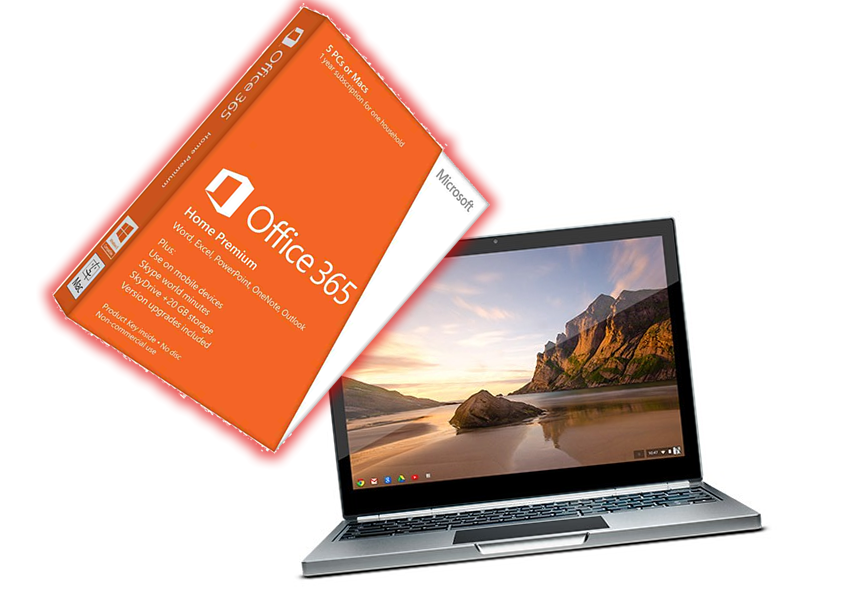Office is the only thing that can kill a Chromebook


Google is coming for the enterprise with Chromebooks.
You could, if you wanted, write these clever little devices off as a technical curiosity with little merit. After all, from one angle they look like nothing more than a web browser with a keyboard attached.
But that's the wrong way to look at them. Chromebooks are very good at what they do. They are [full-on post-PC devices[(https://www.zdnet.com/the-chromebook-its-like-an-ipad-but-with-a-keyboard-7000009905/). What they lack in PC-like flexibility, they make up for in simplicity.
In domestic environments that simplicity translates to greater safety and comfort for users who are able to turn them on, get online, and do what they want to do without having to worry about drive-by downloads, having automatic updates breaking things, and so on.
In enterprise environments the attraction of using Chromebook (and Chromeboxes) would be reduced management effort and cost, providing you can carve out use cases that make sense.
Appliance
The idea of "appliance-based computing" in the enterprise not only is not new, but it's also growing. I've had increasing numbers of conversations with CIO-types who are seeing devices end up in their server rooms that rather than being based on multi-functional Windows are based on tightly controlled Linux distributions.
That appliance-like nature sounds a lot like a Chromebook.
It also sounds a lot like any form of thin-client solution that companies (Wyse, Cisco, and so on) have been trying to sell into the enterprise for years. Make parts of the system more appliance-like in order to gain simplicity in management.
The thing about traditional thin-client is that at the other end you invariably find Windows exposed over virtual desktop infrastructure (VDI). That's a win for Microsoft because they are still shifting a license.
Chromebooks don't have the same shape. They're like thin-client, but they don't need a Windows license.
If you use a web-based enterprise application -- Dynamics CRM, for example -- you can go straight from Chrome to either your on-premises or cloud-based CRM, without touching a Windows client.
(The caveat here is that the application in question has to support Chrome, and as we know many enterprise applications lag in their support for the latest browsers. Hence why Microsoft is looking to deliver something called "enterprise mode" in IE11.)
Office
The problem with any form of computing appliance is that once you go outside of the relatively thin use cases, you're stuck. Similarly, you can't use a refrigerator to roast a turkey.
For Chromebook, the problem is Office.
Office has such an enormous footprint in the enterprise that that chances of you managing to develop a universal set of use cases that applies to the whole business that does not include Office is vanishingly small. Or to put it another way, when it comes to Office: "you are gonna need it".
Plus, Office's footprint is set to get bigger as we start to see traditional telecoms systems replaced by Lync and Skype. Neither Lync nor Skype will run on Chromebooks.
The get-around for this is to run an RDP client on the Chromebook and connect into a VDI-exposed Windows desktop.
But wait! If you do that, you're not getting anywhere. All you have is a thin-client solution and there's a reason why thin-client solutions aren't universal. Namely that for most businesses it's easier to roll out a whole bunch of Windows desktops and have done with it.
If you do that, if you make a Chromebook look like a thin-client, you've moved effectively nowhere. All you've done is save (perhaps) a little on capex on the actual devices, but created more management overhead. Plus you'll be "overly innovative" -- none of your peers will be able to support you because you would have done something weird. There's often benefit in being just one of the herd.
Microsoft is a successful business because the enterprise products -- Windows client, Windows Server, Active Directory, and various bits of management guff -- work really well together. It's that whole collection of stuff that Google wants to unseat.
Death of Office
The tension in all this comes from how far Microsoft is willing to separate Office and Windows. At the moment, those two things are tightly coupled -- you can't get the "full strength" of Office without Windows. (OK, so there's Office for OS X, but who's going to roll out Macs in the enterprise over Office?)
However, as Microsoft starts to follow its "devices and services" mantra, and when we start to consider the "devices" in that statement as being about any device Windows or otherwise, we start to run into a problem
If a web-based version of Office existed that had one-to-one functional parity with desktop Office, you could run a Chromebook in most enterprise scenarios and not lose anything.
Microsoft loses a lot. They start by losing a Windows client license. It then goes on to lose dependence on Active Directory. From there it loses dependence on its management tools. The comes its server licenses. The whole Microsoft ecosystem in the enterprise starts to unravel.
Will Microsoft ever make a full strength Office available in any package other than one that has to be installed on Windows?
Somehow I'll doubt whether we'll ever see full strength Web-based Office. After all, Office is the only thing that can kill a Chromebook.
What do you think? Post a comment, or talk to me on Twitter: @mbrit.